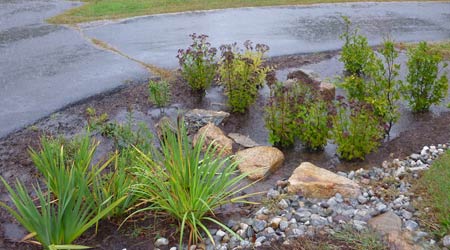By Grace McFadden
A team of professors and students from UConn are working with Connecticut towns to one local environmental issue: stormwater runoff.
Michael Dietz is a co-director of Center for Land Use Education & Research, or CLEAR, the director of Connecticut Institute of Water Resources, and one of the leads on the project. He is part of the team of staff and students that received a grant last summer from the National Fish and Wildlife Foundation (NFWF).
Dietz explained that rainwater runoff can have a detrimental effect on local waterways.
“Mainly because of all the development that we have in our state, all the impervious surfaces, like roads, parking lots, driveways, rooftops, all that water gets channeled very quickly into our local waterways in essentially as untreated for the most part,” explained Dietz.
According to Dietz, this changes the hydrologic cycle of those waterways. The hydrologic cycle is the continuous circulation of water in Earth’s atmosphere. That means stormwater runoff can allow toxic compounds to seep into the water.
“The Long Island Sound is the ultimate receiving water for all of our surface waters here in the state are most of them. So it can lead to low oxygen in the sound, it can lead to beach closures and the sound because of excess bacteria in that storm water, and a variety of other problems,” Dietz said.
The grant allows the team to work to create stormwater runoff solutions with five different Connecticut towns: Branford, Clinton, Deep River, Guilford, and Madison. The grant will continue into next summer.
“The big picture with this is we are trying to help communities in the state figure out how to reduce their impact on local waters, including the Long Island Sound. Urbanization has caused a lot of negative impacts on our local waters, and cities have to try to figure out how to reduce their impacts and make some improvements to the impaired waters in their towns.” Dietz said.
The other principal investigators on this project are Center for Land Use Education & Research Mobile Mapping Educator David Dickson, and Center for Land Use Education & Research Director Chester Arnold.
The project also uses the help of undergraduate students, who led the way in proposing solutions for the towns. The students researched tailored solutions for each town and then presented them in a report to the town. Dietz explained that this allows the project to be both a learning experience and an opportunity to create actionable change.
“We’re basically teaching them how to look at a town and figure out where the opportunities are to retrofit and implement some green stormwater practices,” Dietz said. “For all five of the towns that were involved with these projects, the students actually presented their reports to the town at the end of the summer. So they were heavily involved and got to interact with the first selectman and engineers in these towns.”
For this grant, the towns involved will pick one of the projects presented by the students and work towards implementing it. Dietz gave the example of rain gardens.
“Things like rain gardens, which is basically just a depression in the landscape that’s designed to collect stormwater from some of these impervious surfaces,” Dietz said. “It has native plants in there that help to cycle those pollutants and break them down and let that water infiltrate into the ground.”
Dietz also gave the example of vegetated roofs, which collect rainwater. Dietz also teaches about different practices to combat the detrimental effects of stormwater runoff. When teaching about these solutions, he luckily has a good example very close to home.
“I use the stuff that we put in on campus here as examples throughout the whole semester throughout the whole year. So we have over 70 individual practices that have been installed here on campus since 2004. So UConn has become a national leader in implementing these things,” Dietz said. “And I give lots of tours of these things to various classes and visitors to campus. So we have a really nice demonstration of these things right here on campus.”


